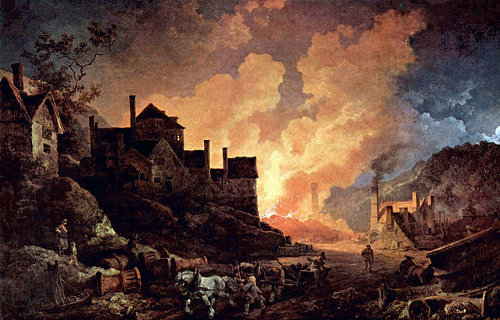
In 1830 engineer James Nasmyth visited England’s Black Country:
The earth seems to have been turned inside out. Its entrails are strewn about; nearly the entire surface of the ground is covered with cinder-heaps and mounds of scoriae. The coal, which has been drawn from below ground, is blazing on the surface. The district is crowded with iron furnaces, puddling furnaces, and coal-pit engine furnaces. By day and by night the country is glowing with fire, and the smoke of the ironworks hovers over it. There is a rumbling and clanking of iron forges and rolling mills. Workmen covered with smut, and with fierce white eyes, are seen moving about amongst the glowing iron and the dull thud of forgehammers.
Amidst these flaming, smoky, clanging works, I beheld the remains of what had once been happy farmhouses, now ruined and deserted. The ground underneath them had sunk by the working out of the coal, and they were falling to pieces. They had in former times been surrounded by clumps of trees; but only the skeletons of them remained, dilapidated, black, and lifeless. The grass had been parched and killed by the vapours of sulphureous acid thrown out by the chimneys; and every herbaceous object was of a ghastly gray — the emblem of vegetable death in its saddest aspect. Vulcan had driven out Ceres. In some places I heard a sort of chirruping sound, as of some forlorn bird haunting the ruins of the old farmsteads. But no! the chirrup was a vile delusion. It proceeded from the shrill creaking of the coal-winding chains, which were placed in small tunnels beneath the hedgeless road.
He added: “I sat down on an elevated part of the ruins, and looked down upon the extensive district, with its roaring and blazing furnaces, the smoke of which blackened the country as far as the eye could reach; and as I watched the decaying trees I thought of the price we had to pay for our vaunted supremacy in the manufacture of iron. We may fill our purses, but we pay a heavy price for it in the loss of picturesqueness and beauty.”
